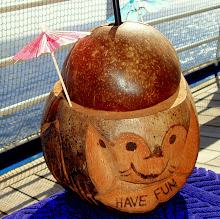It seems like everyone has their two cents on nutrition and healthy living, and even with one hand in the Cheeto bag, most people I've met like the idea of "healthy" in its most abstract form. Salad = good. Moving around = good.
I optimistically (foolishly?) believe that when people have fewer stressors hampering their self-control, and more resources like time, money, and support at their disposal, they gravitate toward a healthier way of life.
But what is healthy, and how healthy is healthy?
Have you ever been watching a TV show, or listening to a friend, or flipping through a magazine, and thought that a suggestion for better nutrition/fitness/wellness was kind of... weak? Then you step back and realize that it
is in fact a drastic improvement over the norm. I've noticed that the more passionate I get about clean eating, the less I find everyday foods acceptable, and the more I find specialty foods a necessity.
For instance, when I was watching
Jamie Oliver's Food Revolution I was a little taken aback by the ostensibly fresh, healthy meal he prepared for the family (as an alternative to the deep-fried Everything they were eating): spaghetti. Or, for that matter, the dish he cooked up with the son: chicken stir-fry. Neither seemed particularly healthy. Why was I somehow expecting a pile of raw veggies, some kind of flax seed/Greek yogurt smoothie, and a loaf of sprouted grain bread- or at the very least, whole wheat pasta? I mean, Jamie Oliver's a celebrity chef, not a rabbit.
That had just become my new notion of "healthy". Which is kind of weird.
I thought about it a bit, and realized that a couple years ago I would have thought spaghetti and salad was healthy, without question. Then, a couple months ago I would have thought anything whole-wheat, whole-grain, etc. was just fine regardless of additives and preservatives. I'm aware that the relativism runs in both directions; right now I eat clean/local/organic whenever I can, but it's not a stretch to think that a raw food vegan would look at my dinner as quizzically as I looked at that spaghetti.
It's clear to me that there are no absolutes when it comes to healthy eating, and there are always ways to improve. Even if your diet has a perfect balance of carbs, proteins, and fiber, it could be more sustainable (and nutrient-rich). Is true healthy eating something of a myth, a bar that we set impossibly high so that we can at least approach it?




